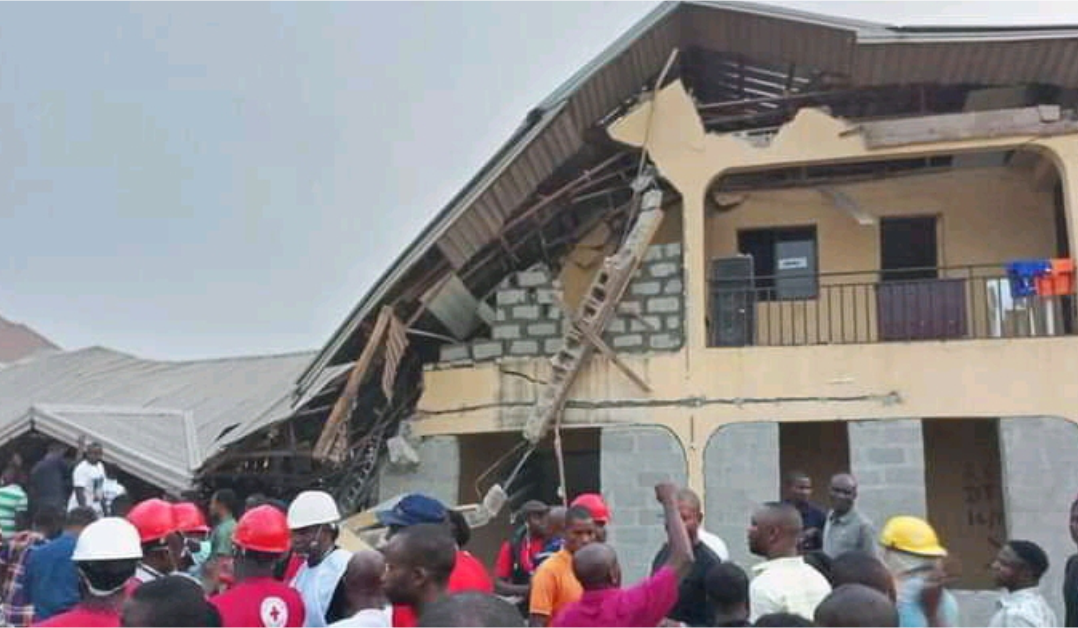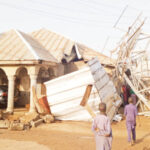An hour after my father and other relatives wrapped up a family funeral in Osumenyi, my ancestral home, the ceiling of the church in which they’d been in spontaneously collapsed. I received the video via WhatsApp and the sight of the destruction gave me goose pimples. It does no good to wonder the many what-ifs but had it happened an hour earlier, it would have been catastrophic for our family. There certainly would have been fatalities. We thank God that the ceiling was held up for the duration of the funeral service; that it was held up until the church was empty but what on earth is going on with some of these constructions in Nigeria?
The world has its share of catastrophes but when your country has more than its fair share of it, it is important – despite your love of country- to ask why. Building collapses are not limited to Nigeria. In 2021, Champlain Towers South, a 12-storey beachfront condominium in Surfside, Miami, collapsed. Last weekend, the floor of a pub in East London caved in. However, the frequency with which such incidents occur in Naija is worrying. Google buildings collapse in – – – and feed in any big city in Nigeria, and Google is likely to throw you an article or more about collapsing structures in that city in recent years. I tried it for Enugu, Abuja, Aba and Lagos, and I can tell you that in August of last year, a three-storey building collapsed in Enugu. In July of 2020, a two-storey one fell in Abuja.
- EU plans €508m intervention in Nigeria
- NIGERIA DAILY: What Racketeers Make Off Nigerians As Fuel Scarcity Persists
In September 2020 and December 2021, two buildings collapsed in Aba. Perhaps, the best known one happened on November 1, 2021 when a 21-storey luxury apartment building toppled and fell like a poorly constructed Lego tower, killing at least 44 people, including its owner, Mr Osibona, and his friend who’d stopped by on his way to the international airport. The day after Osibona’s building collapsed, a two-storey partially finished building in Osapa London, Lekki, also caved in after a heavy rainfall. Two weeks later, a one-storey building fell in the Magbon area of Lagos, killing four people and injuring many others. According to an article quoted in The Conversation, 115 buildings (mostly residential) collapsed in Lagos alone between 2005 and 2016, leaving at least 4,000 families homeless. I couldn’t find statistics for other cities in Nigeria, but I wouldn’t be shocked if they are as damning. Lagos isn’t likely to be an outlier in terms of shoddy construction jobs. Over 100 buildings collapsing in one city alone over 11 years isn’t fate but carelessness that is intensely criminal.
In the aftermath of the November 1, 2021 tragedy, the head of the Lagos State Building Control Agency, Gbolahan Oki, told reporters that the approval the developer had was for a 15-storey building rather than the 21 floors it ended up being. Also, per reports, the site was closed five months before the collapse and the approval to develop withdrawn because it was discovered that there were problems in the construction process. However, the approval was later granted again. Lagos State authorities set up an independent panel of investigation into the cause of the collapse and in January of 2022, the panel presented its report to Governor Sanwo-Olu. It reportedly states that the “building collapse is rooted in the collapse of values, morals and ethics which we need to work on as a nation.”
In March 2016, Lagos State government apparently published a list of about 40 buildings that were identified as distressed or abandoned. According to the Guardian, all the buildings are still standing. The building that collapsed in Abuja in 2020 was supposed to be a bungalow but the developer was trying to ‘upgrade’ it to a two-storey building. According to Premium Times, the Department of Development Control had given the developer a ‘stop work’ notice when it noticed a modification of the building which was ignored. In the aftermath of the 21-storey building tragedy, there were allegations of subpar building materials used in construction, of inspections passed over, of contractors cutting corners and so on. Similar allegations have also been made in the other incidents.
Although the law allows state governments to prosecute developers and construction engineers, per The Conversation, there is little evidence to show that erring developers and engineers have ever been prosecuted. In a country where money speaks, this is not completely surprising. And so lives continue to be wasted. The government must do better in ensuring that the bodies responsible for ensuring the quality of constructions do the jobs they are mandated to do.
In addition, it behooves contractors and developers to remember that when one finger dips itself into palm oil, it soils all the other fingers. We are interconnected, and a poorly constructed building doesn’t recognise who benefited from its shoddiness and who is an ignorant victim. One day, they too (or their loved ones) may be victims of their own greed and careless work.

 Join Daily Trust WhatsApp Community For Quick Access To News and Happenings Around You.
Join Daily Trust WhatsApp Community For Quick Access To News and Happenings Around You.


